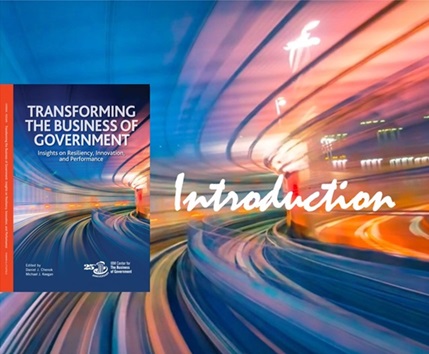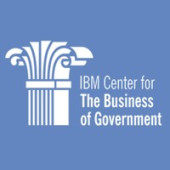Dec12

Today governments face very serious, seemingly intractable public management challenges that go to the core of effective governance and leadership, testing the very form, structure, and capacity required to meet these problems head-on. Many of these challenges are wickedly complex not respecting bureaucratic boundaries, nonlinear, and fluid in nature: “where very small effects may produce disproportionate impacts” In many ways, traditional approaches of government seem obsolete and incapable of properly responding to them. Prescriptions abound on how best to address these issues coalescing around calls for whole of government or enterprise and networked approaches.
Moreover, government leaders continue to face the unforgiving realities of disruption and uncertainty. Agency officials increasingly indicate that what were previously viewed as Black Swan events are now becoming more frequent—and more destabilizing. The vulnerability of social and economic well-being is magnified by reliance on both connectivity and distributed value chains subject to disruption on multiple fronts. Risks have grown due to complex variables such as geopolitical conflicts, multiple public health emergencies, and natural disasters (e.g., wildfires, hurricanes, drought); addressing risks has placed renewed emphasis on the importance of being resilient. The combination of perpetual uncertainty and an ever-evolving risk environment continuously overtakes current planning models.
Given this new reality, government leaders need practical, actionable insights on how best to manage and lead through uncertain and disruptive periods. That’s why we released our new book, Transforming the Business of Government: Insights on Resiliency, Innovation, and Performance.
From Mission and Management Challenges to Preparing for Uncertainty. In 2021, the IBM Center released its most recent research agenda to meet the immediate mission and management challenges facing government executives. Along with pursuing this agenda, we also dedicated time and resources to explore how best government agencies can prepare, address, and overcome the disruptive inevitability of “future shocks”—those increasingly common and severe events that have effects within and across nations. Partnering with the National Academy of Public Administration (Academy) and the IBM Institute for Business Value, as well as other U.S. and global partners, the Center launched a “Future Shocks” initiative in 2022 to help government leaders further identify core capabilities critical to building resilience, building on lessons learned from pandemic response efforts.
Governments, around the world have navigated and responded to the impacts of the pandemic and have captured valuable lessons and gained an understanding of critical areas of focus. The Future Shocks initiative sparked a series of international roundtable discussions with global leaders from across the public, private, academic, and nonprofit sectors to capture lessons learned, share insights, and offer guidance across five core domains:
In each of these areas, insights from these roundtables were documented in a series of published reports that offer strategies and actions to help governments address challenges that lie ahead. Insights derived from the Future Shocks series and reports inform the first six chapters of this book.
Leveraging Innovation and Performance to Drive Government Forward. To commemorate our 25th anniversary and identify innovative ideas that help government move forward in the face of inevitable uncertainty, the Center conducted a Challenge grant competition. This competition solicited essays from academics and thought leaders describing a future of government that can help inform agency readiness—identifying strategic actions for innovation and performance to drive agency missions forward. These essays pointed to new ways of understanding and framing problems; new processes to solve problems; and new implementation solutions. The essays, featured in the second half of this book, focus on a handful of specific topics:
Nine essays—encompassing such topics as AI, quantum computing, data and evidence, oversight, shared services, and customer experience—comprise Part III, chapters 7-15 of this book.
Part I. Roadmaps to Government Resiliency. Resilience involves more than pushing through after adversity or disappointment—but rather, resilient organizations turn crisis into opportunity and discover value in the unexpected. Anticipating the future—getting ahead of events rather than being subsumed by them—becomes integral to positioning, resourcing, and preparing an agency for what may come, while always keeping focus on primary mission responsibilities.
As outlined below, the chapters in Part I of this book offer insights and recommendations for government leaders and stakeholders on how best to discover value in the unexpected, and in doing so to more effectively position and lead organizations in the face of the unknown.
Emergency Preparedness and Response. This chapter focuses on the complex and crosscutting nature of disasters that do not respect geography, jurisdiction, political, or organizational boundaries. Emergency management should follow suit, recognizing that a key to success is the strength of networks that enable collaboration before, during, and after a disaster. This chapter reflects on what governments can do in the near term to better prepare and respond to exigent situations, identifying six recommendations and a host of associated action steps.
Cybersecurity. This chapter examines today’s complex cyber threat environment, and the government’s responsibility to secure a safe and secure digital ecosystem. It focuses how best to reduce the impact of cyber incidents by developing and implementing strategies that promote resilience through public-private partnerships. The chapter offers a series of actions designed to help governments emerge stronger from current and future cyber shocks.
Supply Chain. This chapter explores the role that governments play in preparing for supply chain disruptions. It assesses how governments can foresee potential challenges, plan responses ahead of time, and be ready to minimize the impacts of supply chain disruptions. The chapter outlines insights and recommendations on how best to diagnose threats, design responses, and sustain supply chains.
Sustainability. This chapter spotlights the critical importance of integrating sustainability and climate resilience strategies into government institutions as climate impacts continue to mount. It focuses on key issues that include a clean energy transition, sustainable development, and water management, and offers practical insights and recommended actions that governments can take to build climate resilience.
Workforce. This chapter points out that the public sector’s traditional standardized approaches to recruiting, hiring, developing, and retaining talent no longer meet current and emerging needs. It offers insights and recommendations that governments can take to create and sustain workforces needed to address current and future systemic shocks.
Part II. Building Resilience: Preparation and Response. The unprecedented number and scope of catastrophic events stress governments, businesses, communities, and individuals. These cascading, disruptive events have raised fundamental questions about what capacities governments need to anticipate, prepare for, and respond to crises.
In Chapter Six—Eight Areas for Government Action summarizes key capabilities needed to address shocks, identifying recommended actions in eight capability areas that governments can take to anticipate, prepare for, and respond to new challenges that will continually arise. The underlying capacity of governments needs to be significantly augmented across these eight actions in two interrelated ways:
The overarching goal of building these capabilities is to help governments become more resilient in the face of inevitable future shocks.
Part III. On Future Readiness: Insights From Experts. This part introduces compelling insights and timely perspectives from academics and practitioners on a variety of topics that can help governments address evolving future shocks and other scenarios. These nine chapters address larger themes of innovation and performance, to assist government leaders in efforts to enhance agency readiness. Each chapter outlines specific topics, capabilities, skills, technologies, and paths forward. The chapters encompass topics as diverse as AI, quantum computing, data and evidence, oversight, shared services, and customer experience.
Innovation. The following provides an overview of the chapters in this section and gives a sense of the insights offered around the topic of innovation:
AI Literacy: A Prerequisite for the Future of AI and Automation in Government. This chapter outlines a three-phased approach for boosting AI literacy, presenting key actions and practices to make government organizations more responsive in delivering exceptional public services and achieve mission success.
Design Principles for Responsible Use of AI to Enhance CX Through Public Procurement. This chapter delves into the elements of service delivery, including the systems, people, and processes that indirectly influence customer experience (CX). It proposes two ways that public procurement processes can improve CX through artificial intelligence and presents seven design principles to guide the procurement of AI tools in the public sector.
The Quantum Technology Challenge: What Role for the Government? This chapter discusses quantum technology, examining the impact on cybersecurity and cryptography as well as how quantum might impact environmental sustainability and labor. The last sections of the chapter focus on effective government strategies to make the best use of this emerging technology
Using Linked Administrative Data to Advance Evidence-Based Policymaking. This chapter explores how to improve the use of existing administrative data based on a case study of a Statewide Longitudinal Data System (SLDS). SLDS can break down silos within government, facilitate shared governance, and answer research questions between state partners, while highlighting the benefits of data driven decision making. The use of SLDS data is transforming evidence-based policymaking, providing a model for how states and other governmental entities can better leverage administrative data for a broader set of purposes.
Performance. The following provides an overview of the chapters in this section and gives a sense of the insights offered around performance:
Toward More Useful Federal Oversight. This chapter recognizes that federal oversight can be made more useful to more users for more purposes. Continually evolving technologies make it easier and more affordable to collect, analyze, and use oversight data and analyses to anticipate, detect, prepare for, prevent, and respond to problems more quickly, fully, and successfully. It seeks to engage others in acting to adopt more useful approaches to oversight that improve government performance on multiple dimensions.
The Future of Payment Integrity within the U.S. Federal Government. This chapter outlines a vision that empowers agencies and federally funded programs, including state administered programs, to use data proactively in promoting payment integrity—transforming the identification, prevention, and recovery of improper payments and mitigating the effects of fraud. It emphasizes a pivot from compliance to prevention-focused strategies, promoting the use of data and analytics and collaboration across government and the private commercial sectors.
Leveraging Inspectors General to Make Evidenced-Based Decisions. This chapter examines the role of Offices of Inspectors General (OIGs), describes the concept of agile oversight, and provides examples of how OIGs can drive greater value.
A “One Agency” Approach to Enhanced Mission Enabling Services. This chapter explores NASA’s approach to mission enablement services, illustrating a proven example of the “one firm” mindset and approach that can be adapted by government agencies. It offers recommendations and considerations to move shared services forward in the federal government.
Building and Maintaining Customer Trust in Government Services. This chapter describes how the ongoing evolution of government customer experience efforts can ultimately succeed and makes a series of predictions on areas where customer experience for agencies may face the most significant challenges over the next few decades.
Looking Forward. The 21st century experience has provided lessons on the power of the unexpected. Yet systems in place to meet anticipated problems have often fallen short in meeting novel challenges. Uncertainty remains constant, despite collective efforts to ameliorate the tension between ongoing operations and inevitable disruptions.
As one expert observer has noted: Longing to reduce uncertainty and doubt has driven much of our progress. The more we noticed, remembered, wrote down, and shared, the more knowledgeable we became and the better we were to pass our learning on for future generations to increase.
With this disclaimer that no one can know for certain what may come next, the insights and actions detailed in this book provide a practical path forward in transforming the business of government to meet evolving demands.
The book is now available at https://www.amazon.com/Transforming-Business-Government-Resiliency-Performance/dp/1538193469
